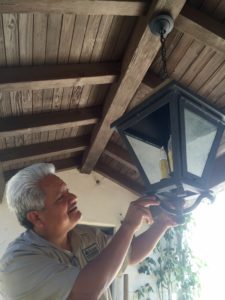Why Small Home Repairs Can Be Expensive?

Have you ever had to replace a single light switch at your home? Or one outlet? Or a filter for your water dispenser? If you were a bit shocked at the price, welcome to the club. I’m even surprised sometimes by the bills I have to send out. The good news is that you are not the victim of some scheming repair person, you are just experiencing the inefficiencies of small repair economies of scale.
Here is a description of the process that takes place to complete just a single small and seemingly simple repair. Let’s say changing a burned-out light bulb in a high ceiling chandelier.
What it takes
In order to perform this repair, someone needs to communicate to the repair person the following: 1) what room it is in, 2) height of ceiling, 3) the shape and type of bulb, 4) the wattage of bulb, 5) the spectrum color of bulb and 6) base size of bulb.

We like to assume that any repair problem being communicated to us is accurate, but they are often not. For instance, if the homeowner calls and says that the light bulb is a regular 60w bulb. The repair person, in an effort to be efficient will go to the store on the way and pick up a 60w bulb. He or she may perhaps purchase a half dozen so there can be some extras for the homeowner to have as stock for the future. When he arrives and learns that in fact the bulbs needed are 40w candelabra’s, the trip and the bulbs will have been a waste and another trip to the store required.
A million options
I have been asked why we don’t keep a stock of bulbs handy on the truck at all times. At HPS we do keep several of the most common types in stock. Unfortunately, these are almost never the correct bulbs needed. To have the right bulb for any given situation would require an entire hardware store full of bulbs in the van. Even then the exact match may not be available. There are millions of different bulb, color, base, wattage and size combinations now available.
And the problem is not just with light bulbs. It is like this for almost every product made for the building industry. Paint, plumbing fittings, electrical switches. The industry has been willing to make a product specific to almost every homeowner’s individual desire.

Good descriptions needed
Sometimes the description of the work from the homeowner is incorrect. I got an emergency call from an out-of-town homeowner last winter during a hard rain. It was reported that there was a terrible leak in the upstairs master closet. The leak was reported by the housekeeper who noted that it must have come from the attic right above the closet.
We dispatched a repair team who found a puddle of water on the hardwood floor in the master closet just as reported. A thorough inspection of the attic, all the plumbing and roof ensued with no evidence of a leak being found. After looking around in the closet we found a wet umbrella that had been used that morning and placed in the closet to dry!
Troubleshooting
If no accurate description of the problem is available, a repair person will need to make a trip to the site to determine it. They will need to travel to the site, set up protections, get out the proper ladder and retrieve the burned bulb.
Once he has a good understanding on the scope of the repair, he will need to pack up the ladder and protection then travel to get the parts and material at the store. At the store he must locate the correct parts and material and make the purchase. Then they must travel back to the site with the material. Now they can actually do the repair.

Set up time
But first the workmen need to protect the work area adequately so that the repair doesn’t make a mess or cause other collateral damage. Then they need to get their tools and safety gear ready. Now they can perform the work. Once the work is finished, they will need to test it to confirm it is a good repair. Then they will need to put their tools away, clean up the site and remove any protection. After finishing, they will need to write up a detailed description of the work performed and leave a copy with the customer. Then they will need to travel back.
Travel time
As you can see, there is a lot of time spent travelling to and from the site, purchasing materials and setting up and taking down tools and protections. All for a single tiny repair.
Lowering costs through efficiency
In order to make repairs more efficient, HPS likes to do repairs in bulk. By grouping a number of repairs together, any time spent traveling, troubleshooting etc. can be spread over many jobs instead of just one. Another way we lower the cost per repair is to know more about the home. Having a database of basic information on the home helps too. This minimizes fact finding and mis-communication and helps workers speed up troubleshooting too.
You may not be able to avoid small repairs completely, but at least now you know why small projects tend to be expensive.
If you need checklists or other ways to combine projects this website is full of information on how to do that.
Help me to help you
Congratulations on taking time to use this free website. I hope you find the information here fun and useful? Please send me your comments and feedback. Writing and maintaining this site is a lot of hard work. By sharing these pages with your friends, you help me to continue the effort. You can easily share these pages to all your favorite social media sites via the shortcut buttons on the sidebar. You can also simply email the page link to your friends. Please share often.
The very best way to help me occurs when you use the embedded links to buy things. Using a link is easy and free, yet it provides a great source of support for this site. The vendors I’ve chosen to link to have proven to be the very best resources available so that is why I recommend them personally.
This is the place to visit if you want information on your home: How to improve air quality; ways to improve the value of your home; what are the best cleaning services; do you really need handyman services; how to plan and execute home renovation and home improvement projects; ways to hire a handyman; what to do during spring cleaning; ways to go about tidying up a messy house; and generally how to be a better homeowner.
If you have questions or just want to say hi, please send me a note.
Thanks again!








